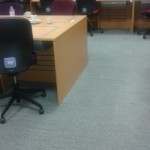I was very pleased to attend 2 researcher events at the end of November, one a USLTG meeting in Aston University and one a Teachmeet in Cardiff. Apologies for the delay in writing up, this is due to being stricken with food poisoning and a throat infection, trying to decipher the auto correct function on my iPad typing, Christmas feasts and holidays. If you love or are interested in researcher support, the Slideshares from Aston are here.
I intrepidly caught the Chiltern Line up to Birmingham and managed to have a quick look at the new Library of Birmingham This was an interesting building and was very modern, it still had bookcases though. ( I also saw a huge Santa and ferris wheel and some Christmas markets).
New Library of Birmingham
Aston University Library has recently been refurbished and had many primary colours as seems to be the current trend and a huge dividable Library training room with about 70 spaces (too huge to photograph).
Some initiatives include: Research bites (Aston) Aston have been running a researcher training programme for 4 years. Research Bites workshops were run during July and August 2014 and tea and coffee were provided. They lasted 20/30 minutes on topics such as advanced literature searching, research data management, open access publishing, how to increase citations. There is a LibGuide (everyone loves LibGuides) and a blog and sessions are recorded with lecture capture and made available.
Aston University Library / small part of the huge training room
Blended learning for literature searching (De Montfort University) De Montfort used to run a one day workshop on literature searching and Endnote as part of the Graduate School offer. Then it became mandatory to offer online courses. The Library had help from an elearning technologist and developed a course on Blackboard. There are 5 units: 1. Literature searching, 2. Developing a search strategy and keywords, 3. Sources, 4. Assessment, 5. Advanced searching. Researchers have a choice as to whether to do the course online or face to face and online. There is an assessment part way through involving writing a reflective piece. Library staff feed back on this and can offer a 121 if necessary and students can continue once this is completed satisfactorily.
Researcher Development (Northumbria University) There is a Library research support team of 10 FTE staff. The team are involved in the following areas: Collection development and eresources, researcher development skills, reference management, scholarly publishing/ open access funding. There are researcher webpages and a “Research compass” is used to show the support at each stage of the research process. There is a online/ printable researcher guide ( I liked this). Consultancy services were piloted, a customer journey map produced on a costed literature service by the hour on salary rate, the process was documented and included in research bid proposals. Results are shared via Endnote. A controlled roll out of the consultancy service has been done. There is a University research conference in May and a researcher development programme and a researcher development week.
Webinars (Leicester University)
There is a You Tube channel for inductions, reference management, research data management etc. There are Plan your literature search bite size videos and tutorial sheets. Webinars at elevenses have been run both a live webinar and in the room. It can be technically difficult, there is a presenter and person dealing with chat online. There are also current or recent PhDs talking about their experience on a webcam recording but not made public, behind a login. These give personal insights into the PhD process. Promotion is via the Graduate School. Leicester also have researcher welcome postcards promoting services and offering help or would you like an appointment? Researchers receive a reply and assistance within a few weeks. ( I liked this idea as a way of connecting). In terms of social media, the Facebook profile has been retired due to lack of response/ likes 🙁 but Twitter is used.
Conclusion
I found the days really useful and interesting and it’s great to have free events that are so informative. It is encouraging to know there is a lot of interest in researcher support and I liked the researcher guide from Northumbria and the welcome/ contact postcards used as Leicester. A talk from Moira Bent at Cardiff discussed that the use of language is important and the term “research partners or collaborators” may be better than the term “researcher support” which can imply a lesser role. It seems that each University has its own approach and there is no size fits all or solution which can be generally applied. I also enjoyed meeting colleagues from other Universities, sharing ideas and festive/ cultural events such as Christmas markets and indulging in one of my favourite leisure activities (photography).
![1485109_10204568691671151_4383809609587332353_n[1]](https://blogs.city.ac.uk/developingatcity/files/2015/01/1485109_10204568691671151_4383809609587332353_n1-1p8ws5l-150x150.jpg)
![1618535_10204568693511197_3236638838586650173_n[1]](https://blogs.city.ac.uk/developingatcity/files/2015/01/1618535_10204568693511197_3236638838586650173_n1-197l87k-150x150.jpg)
![1779219_10204568692711177_8502467740503182953_n[1]](https://blogs.city.ac.uk/developingatcity/files/2015/01/1779219_10204568692711177_8502467740503182953_n1-1u91769-150x150.jpg)


![1506002_10204568691391144_652110117921450167_n[1]](https://blogs.city.ac.uk/developingatcity/files/2015/01/1506002_10204568691391144_652110117921450167_n1-1ugnnd7-150x150.jpg)
![1966701_10204568690951133_3992792748045740676_n[1]](https://blogs.city.ac.uk/developingatcity/files/2015/01/1966701_10204568690951133_3992792748045740676_n1-1ihypd4-150x150.jpg)